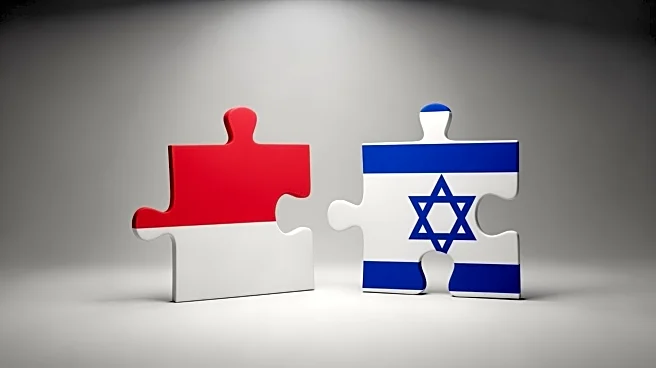What's Happening?
The International Olympic Committee (IOC) has imposed sanctions on Indonesia following the country's refusal to grant visas to Israeli gymnasts for the World Artistic Gymnastics Championships. The IOC has urged international sports federations to refrain
from hosting events in Indonesia until the government ensures that athletes of all nationalities can compete. Additionally, the IOC has suspended discussions regarding Indonesia's potential bid to host the Olympic Games until such assurances are provided. The decision comes after Indonesia, a predominantly Muslim country, denied entry to Israeli athletes amid tensions over Israel's military actions in Gaza. The Israeli Olympic Committee has expressed support for the IOC's stance, emphasizing the importance of inclusivity in sports.
Why It's Important?
This development highlights the intersection of international sports and geopolitical tensions. The IOC's decision underscores the importance of non-discrimination in global sporting events, which are meant to foster unity and fair competition. By sanctioning Indonesia, the IOC is sending a strong message about the need for host countries to uphold the principles of inclusivity and equal opportunity for all athletes, regardless of nationality. The situation also reflects broader diplomatic challenges, as Indonesia does not have formal ties with Israel. The sanctions could impact Indonesia's aspirations to host future Olympic Games, affecting its international standing and potential economic benefits from such events.
What's Next?
The IOC has called for discussions with the Indonesian Olympic Committee and the International Gymnastics Federation to address the visa denial issue. These talks will likely focus on ensuring future compliance with IOC regulations regarding athlete participation. Indonesia's response to these sanctions and its willingness to amend its policies will be crucial in determining its eligibility to host international sporting events. The situation may also prompt other countries to review their policies on athlete participation, potentially influencing international sports governance and diplomatic relations.
Beyond the Headlines
The incident raises questions about the role of sports in international diplomacy and the ethical responsibilities of host nations. It highlights the potential for sports to be used as a platform for political expression and the challenges of maintaining neutrality in global competitions. The IOC's actions may set a precedent for how similar situations are handled in the future, influencing the relationship between sports organizations and host countries.















